EngageBay
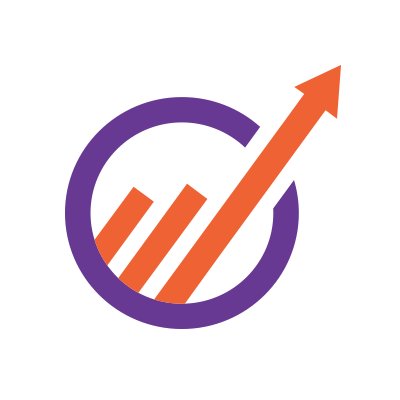
- All-in-one CRM platform
- Sales automation and pipeline
- Email marketing automation
- Helpdesk and ticketing system
- Landing page builder
Spotler

- Marketing automation tools
- Advanced email campaign
- CRM and lead management
- Behavior-based segmentation
- Reporting and analytics tools
Zoho CRM
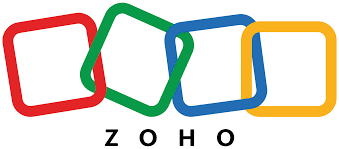
- Advanced sales automation
- Customizable dashboards
- Multi-channel support
- AI-powered sales assistant
- Lead and contact management
Are you tired of juggling spreadsheets, losing track of follow-ups, and letting valuable leads slip through the cracks?
A powerful Customer Relationship Management (CRM) system is the engine of a modern sales team.
It transforms chaos into clarity, helping you stay organized, build stronger customer relationships, and close more deals—efficiently.
But with countless options on the market, choosing the right one can be overwhelming. This guide cuts through the noise to bring you the best CRMs for sales in 2026.
Whether you’re a solo entrepreneur or part of a large sales force, we’ll help you find the perfect tool for your needs.
Quick Look: Top Sales CRMs
| Tool | Best For | Key Strength |
| EngageBay | Small businesses wanting an all-in-one platform. | Unbeatable affordability for a full marketing, sales, & support suite. |
| Spotler | B2B sales teams needing integrated marketing. | GDPR compliance and strong B2B lead management features. |
| Zoho CRM | Businesses that require deep customization. | Highly customizable modules and powerful workflow automation. |
| Salesforce | Enterprises and teams that need to scale. | Unmatched power, scalability, and a vast third-party app ecosystem. |
| HubSpot CRM | Teams prioritizing ease of use and a free solution. | An incredibly user-friendly interface and a robust free-forever plan. |
| Insightly | Sales teams that manage complex projects. | A unique combination of CRM and built-in project management tools. |
6 Best CRM for Sales In 2026: Which One To Choose?
1. EngageBay
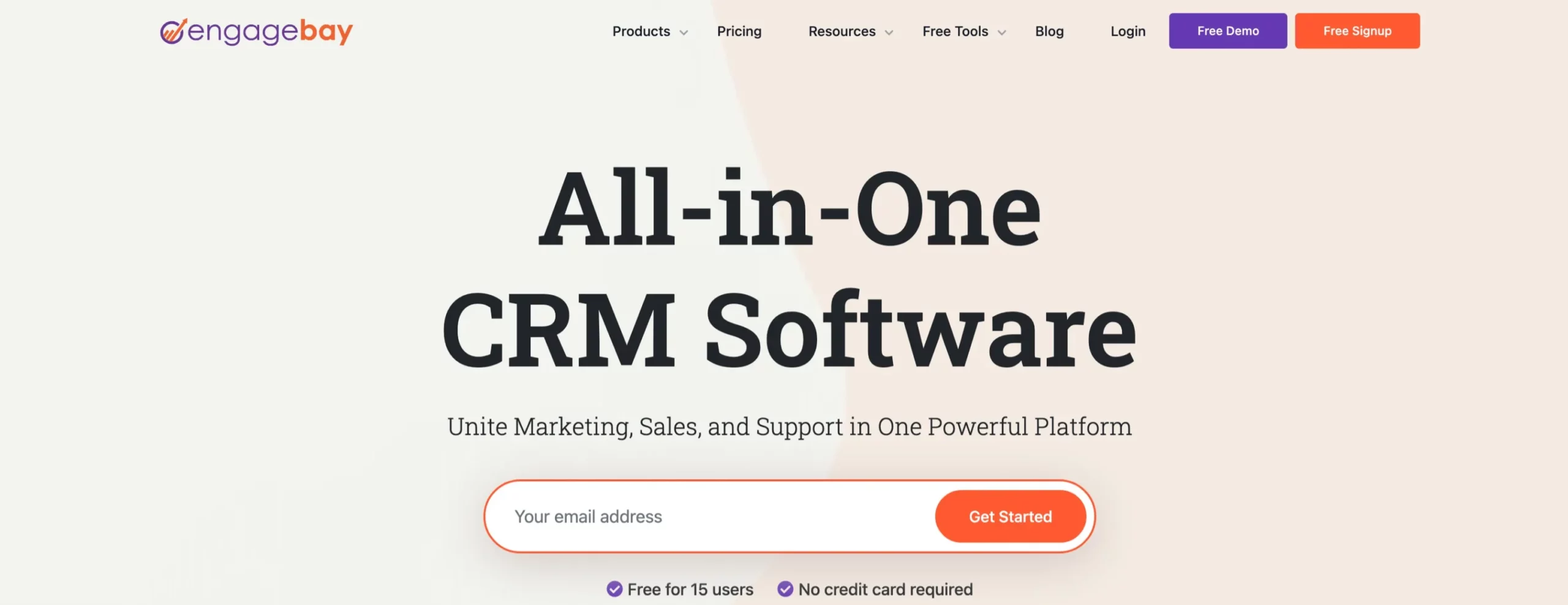
EngageBay is an all-in-one sales, marketing, and service automation solution with a free CRM facility.
EngageBay can be used to attract and engage the target audience and clientele, helping to convert them into long-term, satisfied customers.
The EngageBay software can be divided into three logical areas: marketing, service, and sales. The best part is that one can opt to pay for the full package or buy the pieces that they need.
The three parts of the package are explained below.
Key Features:
- Sales Automation: Automate email sequences, tasks, and lead nurturing workflows.
- Visual Deal Pipeline: Easily track opportunities as they move through your sales stages.
- Contact Management: Get a 360-degree view of every contact, including all interactions and activities.
- Appointment Scheduling: Allow leads to book meetings directly on your calendar.
Pros & Cons of EngageBay
Pros
- Affordable pricing for small to medium businesses.
- User-friendly interface with easy navigation.
- Comprehensive all-in-one solution for marketing, sales, and support.
- Powerful automation tools for streamlined workflows.
- Excellent customer support with quick response times.
Cons
- Limited advanced features in lower-tier plans.
- Occasional slow performance with large datasets.
- Mobile app functionality could use improvements.
2. Spotler
Simple yet extremely sophisticated, Spotler is an easy-to-use CRM that offers a myriad of features, such as contact management and marketing automation, for clients, suppliers, vendors, and leads.
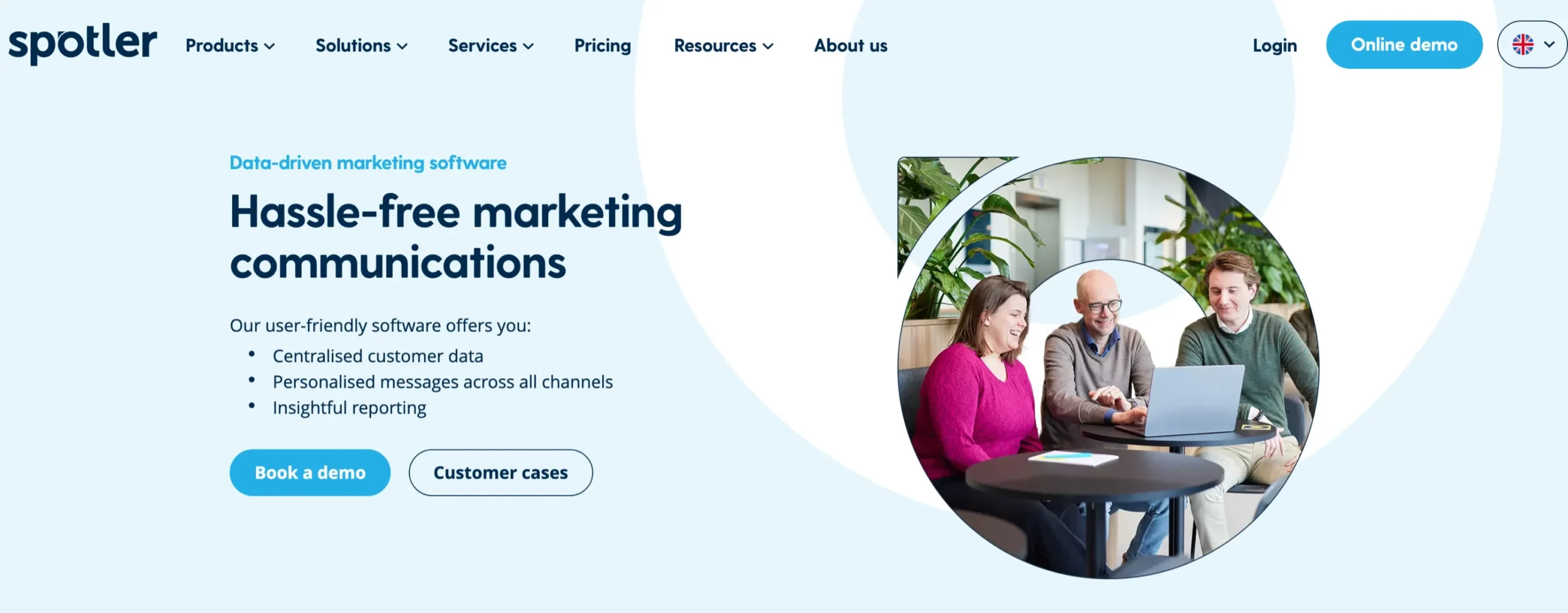
It also features the ability to automate Salesforce and service tools, which helps induce customer satisfaction.
Spotler also offers advanced data security and encryption features, which make this CRM the preferred choice for the government and other financial organizations.
Key Features:
- Lead Management: Capture leads from web forms and automate assignments to sales staff.
- Marketing Automation: Build and send email campaigns and newsletters from within the CRM.
- Contact & Account Management: Keep detailed records of clients, suppliers, and leads.
- Data Security: Advanced security features make it a trusted choice for finance and government sectors.
Pros & Cons of Spotler
Pros
- Robust marketing automation tools for personalized campaigns.
- Easy-to-use interface with intuitive design.
- Strong email campaign features with advanced tracking.
- Excellent lead management and segmentation capabilities.
- Detailed reporting and analytics for performance insights.
Cons
- Limited CRM functionality compared to dedicated CRMs.
- Pricing can be high for small businesses.
- Steeper learning curve for advanced features.
- Ask ChatGPT
3. Zoho CRM
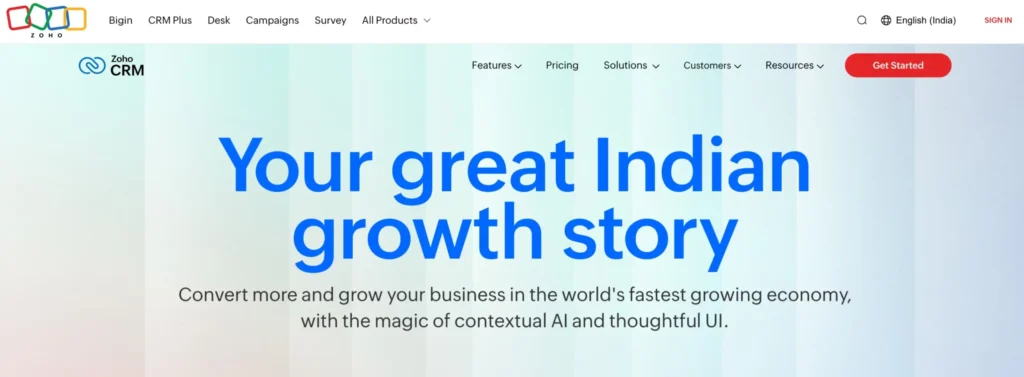
Zoho CRM is capable of catering to businesses of every size and type, thanks to its user-friendly interface, automation capabilities, social media integration, and customizable modules.
The platform enables users to define all workflows, rationalize their daily tasks, manage leads, and automate processes.
It also enables integration with Facebook, Twitter, and Google+, allowing users to quickly and accurately reach out and communicate with potential leads.
It’s available for free for up to three users at a time, although it has its limitations in terms of features.
It also offers limited customization, but users are allowed to send around 50 individual emails per day, while also having access to a maximum of 10 email templates.
Key Features:
- Sales Force Automation: Automate lead scoring, assignments, and follow-up tasks.
- Process Management: Define and build your ideal sales process with custom rules and workflows.
- AI-Powered Sales Assistant (Zia): Get predictions, suggestions, and alerts to stay on top of your deals.
- Multichannel Communication: Engage with customers via phone, email, live chat, and social media.
Pros & Cons of Zoho CRM
Pros
- Highly customizable to fit specific business needs.
- Powerful sales automation and workflow tools.
- Advanced analytics and reporting capabilities.
- Excellent integration with third-party apps.
- Affordable pricing with scalable plans.
Cons
- Steep learning curve for new users.
- Some features can be overwhelming for beginners.
- Mobile app functionality can be improved.
4. SalesForce
Salesforce’s services enable all businesses to leverage cloud technology, connecting with customers, partners, and potential customers more effectively.
Companies use Salesforce to gain a deeper understanding of their customers, connecting with them on multiple levels and helping them expand their customer base.
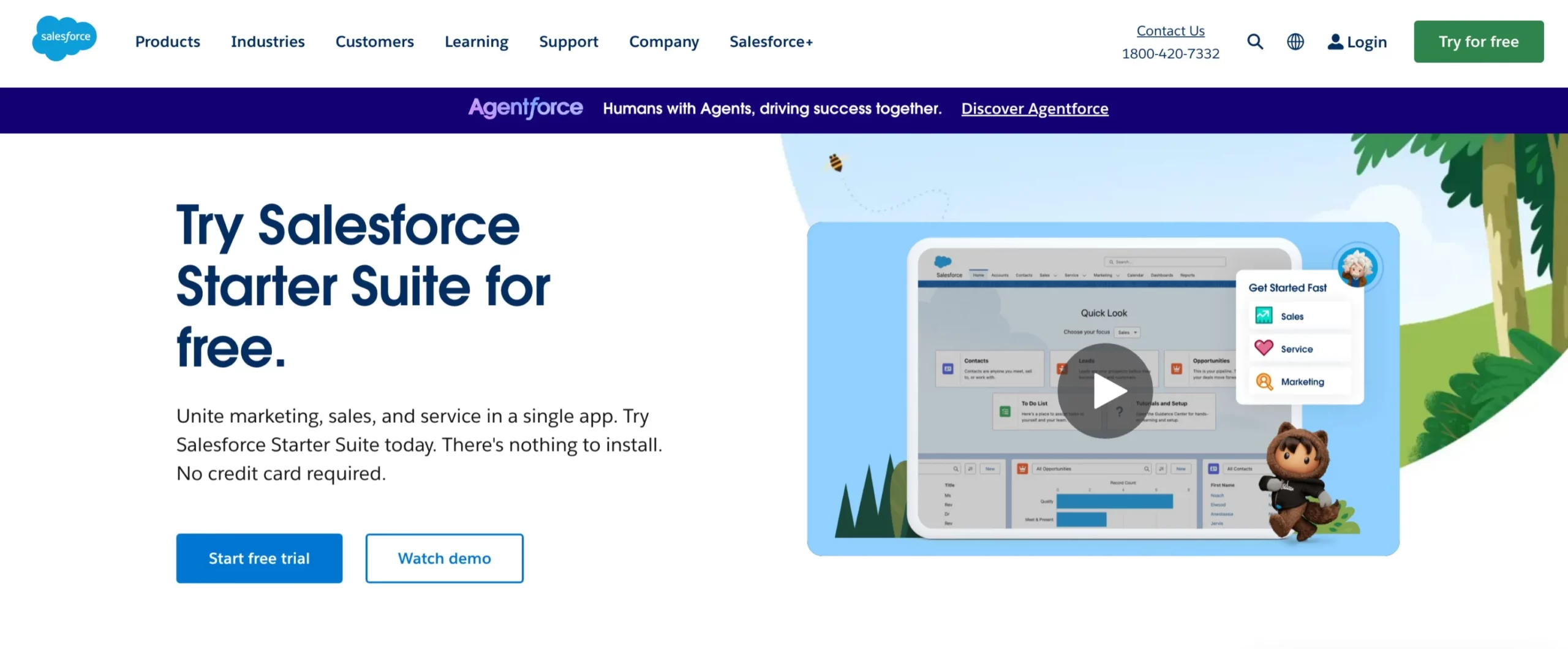
This cloud-based software also enables companies to track analytics, customer complaints, and various other CRM functions, as well as the rate of customer success and support, with the ease of cloud storage and easy access, available on a real-time basis, regardless of the users’ location.
Key Features:
- Opportunity Management: Get a complete view of every deal, including stage, competition, and key contacts.
- Contact Management: Access critical customer data and interaction history from anywhere.
- Einstein Analytics (AI): Leverage artificial intelligence for advanced sales insights and predictions.
- AppExchange: Extend functionality with thousands of third-party apps and integrations.
Pros & Cons Of Salesforce
Pros
- Highly customizable and scalable for businesses.
- Powerful CRM with advanced features.
- Extensive integration capabilities with third-party apps.
- Robust reporting and analytics tools.
- Excellent customer support and resources.
Cons
- Can be expensive, especially for small businesses.
- Steep learning curve due to complex features.
- Setup and customization can be time-consuming.
5. HubSpot CRM
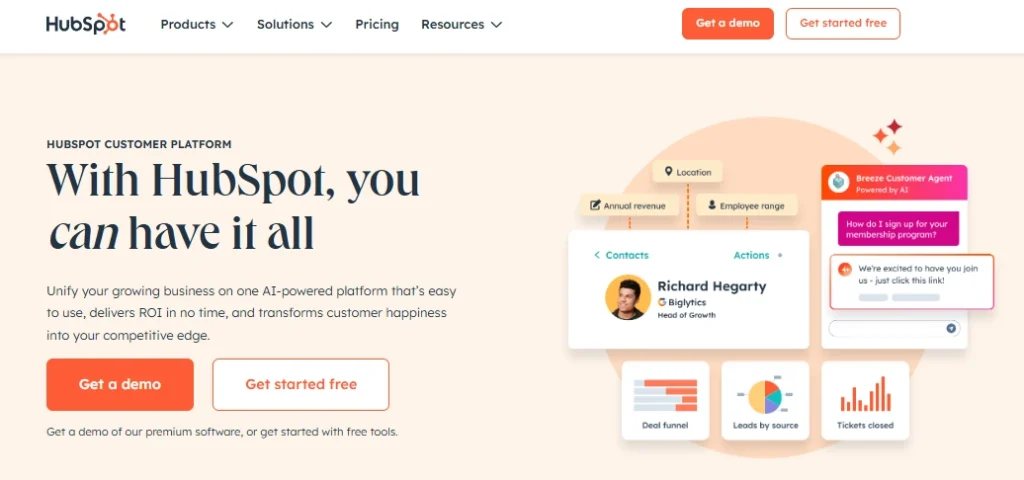
HubSpot is an inbound sales and marketing platform that helps different companies attract new visitors, convert leads, and close customers.
This CRM achieves this by consolidating various functionalities, enabling all marketing and sales departments to manage their activities and work in a single location.
This also includes content creation, lead capture, customer relationship management, social media sharing, workflow automation, sales pipeline mapping, and performance tracking.
Owing to these features, companies are better equipped to manage all sales and marketing activities efficiently, while leads can be nurtured effortlessly through the customer’s journey.
Key Features:
- Free CRM Platform: A robust, free-forever plan with all the essential features.
- Sales Pipeline Management: A clean, visual pipeline to track deals at every stage.
- Email Tracking & Notifications: Get real-time alerts when leads open your emails or click on links.
- Meeting Scheduler: A built-in scheduling tool that syncs with your calendar.
Pros & Cons of HubSpot CRM
Pros
- Free plan with essential CRM features.
- User-friendly interface and easy setup.
- Seamless integration with HubSpot’s marketing tools.
- Excellent reporting and analytics capabilities.
- Strong customer support and resources.
Cons
- Limited features in the free plan.
- Can become expensive as you scale up.
- Some advanced features are only available in higher-tier plans.
6. Insightly
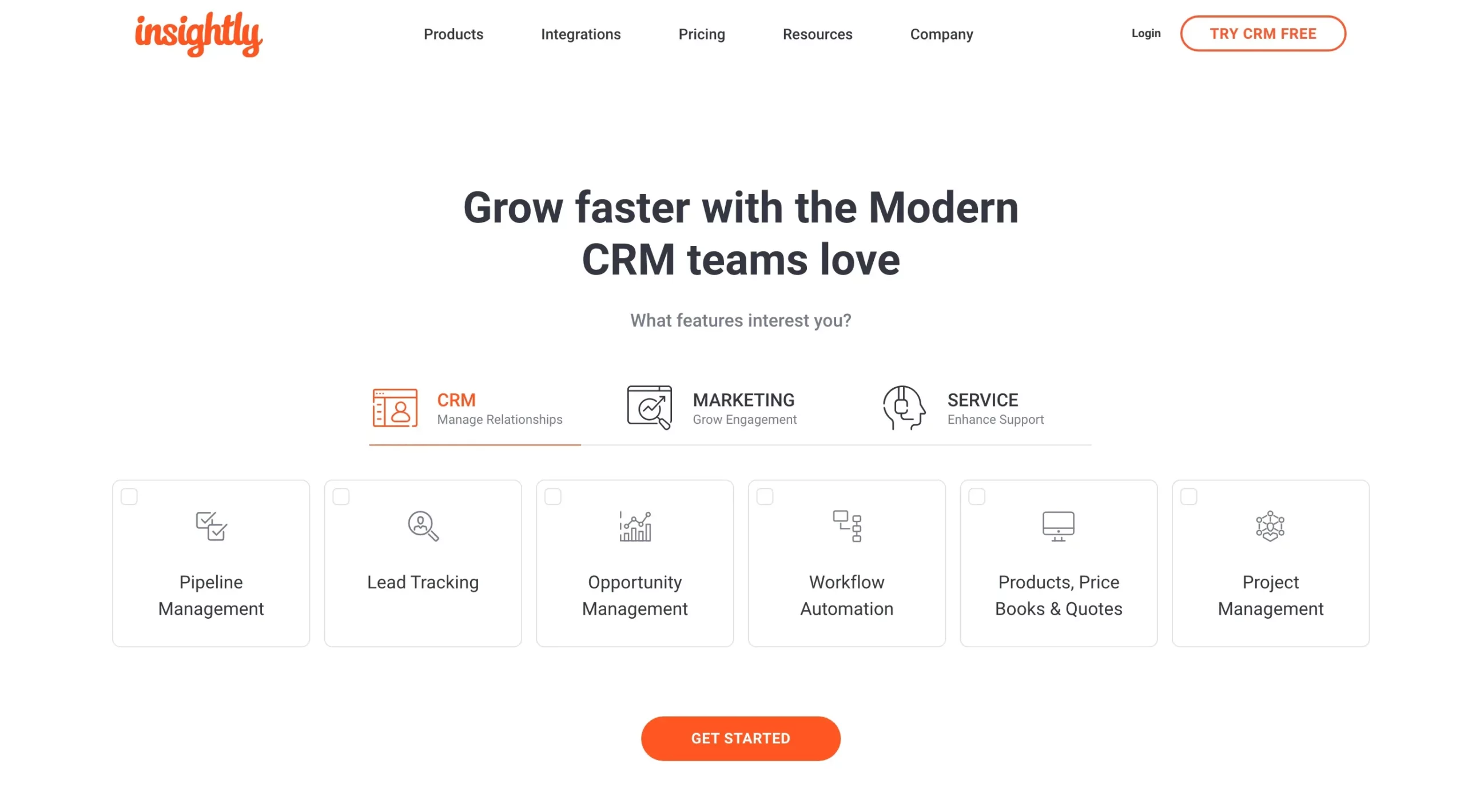
Insightly is well-integrated with Microsoft Office 365 and G Suite, which covers Gmail, Excel, and Outlook integrations.
For those involved in selling businesses, this CRM tool provides a well-integrated pipeline for sales across all its features, including customer data, contact management, and lead tracking.
With well-maintained to-do lists, it’s easy to assign work to all team members. The business intelligence or BI features present here are also very useful, such as CRM features.
This feature also helps collect both old data and real-time data within the CRM platform, ensuring that users have the necessary information to boost their sales performance.
Insightly also builds its Business Intelligence into the dashboards in an extremely visual yet simple way.
Key Features:
- Integrated Project Management: Convert won opportunities into projects and manage post-sale delivery within the same platform.
- Lead Management & Tracking: Track relevant lead information, including a rich timeline of all marketing and sales interactions.
- Workflow Automation: Create complex, multi-step business processes to automate tasks, send alerts, and update records.
- Business Intelligence (BI) Dashboards: Visualize your sales data in a simple yet powerful way.
Pros & Cons of Insightly
Pros
- Easy-to-use interface with intuitive design.
- Strong project management and task tracking features.
- Customizable workflows and automation tools.
- Excellent reporting and analytics capabilities.
- Good integration with popular third-party apps.
Cons
- Limited customization options for dashboards.
- Mobile app functionality can be improved.
- Pricing can be high for small businesses.
FAQs About The Best CRM For Sales
1. What is the best CRM for sales management?
The best CRM for sales management includes features like lead tracking, sales automation, reporting, and customization. Popular choices are Salesforce, HubSpot CRM, EngageBay, Zoho CRM, Insightly, and Spotler. Each offers different strengths depending on your business needs.
2. How does Salesforce help with sales?
Salesforce is a powerful CRM that offers advanced sales automation, lead management, customizable pipelines, and in-depth reporting. Its scalability makes it ideal for both small businesses and large enterprises seeking a robust sales solution.
3. Why should I choose HubSpot CRM for sales?
HubSpot CRM is user-friendly and offers a free plan with essential sales features like lead management, email tracking, and sales pipeline tools. It’s great for small to medium-sized businesses looking for a simple yet effective CRM to boost sales.
4. How can EngageBay improve sales performance?
EngageBay helps improve sales performance by combining CRM with sales automation tools, email marketing, and helpdesk functionalities. Its all-in-one platform allows sales teams to track leads, automate workflows, and manage customer relationships effectively.
5. What makes Zoho CRM suitable for sales?
Zoho CRM is highly customizable and offers a wide range of sales automation tools, including lead scoring, workflow automation, and pipeline management. It’s a solid choice for businesses of all sizes, particularly those who need flexibility and advanced reporting.
6. Which CRM is best for small sales teams?
HubSpot CRM is the best for small sales teams due to its user-friendly interface, free plan, and scalability. EngageBay also offers an affordable, all-in-one CRM with sales automation that works well for small teams.
Quick Links:
- Top 10+ Best WordPress CRM
- HubSpot CRM vs MailChimp
- Engagebay vs Zoho
- The 7 Best CRM for Ecommerce
Conclusion: Which is The Best CRM For Sales?
CRM is a highly effective feature for all businesses, and the CRM tools available offer similar features. All these tools work very efficiently in helping users manage their businesses.
Although several CRM tools are available on the market, the ones mentioned are considered among the best.
For those seeking the top choice from this list, EngageBay stands out as it offers the most features and customizable sub-packages, while also having the fewest drawbacks for users.
While all other CRMs have technical glitches and may not be very user-friendly, EngageBay is the one that has only one minor issue, which is addressed in its training manual.
